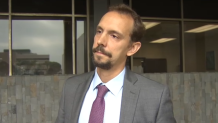Editor’s Note: Since this story was published, a judge ruled that a defendant immigration consultant in one of the Immigrant Rights Defense Council's lawsuits violated state law, and that there was ample evidence of those violations shown during a trial in Orange County. You can read more about that case here.
More than a dozen San Diego County small business owners say they’ve done nothing wrong. They say they’ve dedicated their careers to helping immigrants achieve the American dream. And yet they, and hundreds of their colleagues throughout Southern California, argue they’re facing malicious lawsuits designed for one purpose – to shake them down for tens of thousands of dollars in legal settlements.
These small business owners are registered with the state of California as immigration consultants. Such consultants help immigrants and their families fill out paperwork and navigate our complex immigration system.

For the past two years, Darys Avalos has worked as an immigration consultant, running her own business in Chula Vista. She says her work gives her a major sense of accomplishment.
“It’s very fulfilling to see them reach that goal to get their oath ceremony, they become, yes, citizens,” Avalos told us.
Elizabeth Arroyo Quintero also operates an immigration consulting business in Chula Vista. She says she’s able to help immigrants without charging high prices that some lawyers might charge for the same form-preparation work.
“Attorney fees are quite high in a lot of them,” Arroyo Quintero said. “A lot of my clients could not afford it.”
The Immigration Consultant Act
In California, immigration consultants differ from attorneys and are not allowed to answer basic legal questions or even imply that they are lawyers.
The rules are laid out clearly in California’s Immigration Consultant Act. The ICA was created to protect immigrants from people masquerading as immigration attorneys, promising services they aren’t qualified to do or promising results they can’t deliver.
Some of the rules in that extensive law include:
- Posting signage inside their office advertising their services and prices
- Including disclaimers on documents that state they are not attorneys
- Maintaining a bond of $100,000 in the event consultants make errors or commit fraud
Both Avalos and Arroyo Quintero say they follow and understand the law well. What they say they don’t understand is why they’re being taken to court for violating that law.
“I believe I've done everything right since I've opened my business,” Avalos said.
A flurry of lawsuits from a single attorney

In July, NBC 7 Investigates became aware of the lawsuits filed in San Diego County. When we started digging deeper, we learned this had been happening all over Southern California for years. The bulk of lawsuits were filed in Los Angeles County, with at least 239 since 2015. 43 were filed in Orange County and 7 in Riverside County. Here in San Diego, 19 lawsuits have been filed so far.

Our team gathered more than a dozen of the defendants together. The immigration consultants we talked with that day had even more in common. They were all Latina and Hispanic women and said they didn’t think they’d done anything wrong.
They don't know what hit them. They've never had to deal with anything like this and they're confused.
Bill Anderson, National Notary Association
Many didn’t want to show their faces or be named – saying they feared it could make their lawsuits worse.
“They’re very intimidated and they're scared,” Avalos said. “Some of them don't speak the language.”

The person behind every single lawsuit is Sebastian Medvei, who operates the Medvei Law Group based in Glendale. He has filed hundreds of lawsuits on behalf of the Immigrant Rights Defense Council.
NBC 7 Investigates looked through every single case and determined that Medvei has made more than $2.2 million so far, with most of that coming from settlements. But that monetary figure is likely much higher. 27 of his settled cases don’t include documents that list how much that settlement was. Another 32 finalized cases didn’t have information on the outcome of the case. Of all the cases we received, we found that only two went to trial. In both of those, the judge ruled in favor of Medvei.
“It's very frustrating that we're being attacked,” Avalos told us. “We're all trying to do good for the community. All of our clients never complain about us.”
Nearly identical lawsuits

The defendants and their attorneys describe Medvei’s filings as boilerplate lawsuits with nearly identical wording, except for information about the businesses he’s suing.
“So he literally just changes our names,” Avalos said. “If you'd have certain allegations against each of us, then there'd be different causes of actions listed on the loss. And there isn't.”
Complaints from clients are something we noticed missing from the hundreds of lawsuits we reviewed. In fact, all of Medvei’s complaints contain nearly identical language, without citing specific examples of violations of the ICA. Instead, the lawsuits simply list more than a dozen of the provisions of the law and state the plaintiff “believes and alleges” the law was violated. The law also doesn’t require attorneys to name any victims in lawsuits.
“It was a surprise because I didn't know what I was doing wrong,” Arroyo Quintero said.
Bill Anderson with the National Notary Association decried Medvei’s tactics.
“They list a laundry list of potential violations that an immigration consultant can commit, but they don't show any investigative findings or any showings of proof or actual harm, or that the immigration consultant actually committed these acts,” Anderson said.
Anderson says the law doesn’t leave much room for judges to throw out cases for defendants who try to fight Medvei. He says the law is clear, if there’s any small violation, the defendant is found liable.
“It's really a difficult pickle because the law does give them the authority to do this,” Anderson said.
The pressure to settle
Consultants say after filing, Medvei offers them settlement packages ranging from $5,000-$20,000 to cover his attorney fees and court costs. Many of the women we spoke with say they felt forced to pay him off, fearing an even costlier court battle.
“We have a lot to lose, we have our businesses to lose,” Arroyo Quintero said.
Attorneys for past defendants have filed responses with the court saying, “all these defendants have no choice but to rollover even though they may have been 99.9% effective at doing their jobs correctly and obeying the Immigration Consultants Act.”
Another wrote, “Plaintiff, a private attorney, is a predator…” who “uses the legal system as a means of extracting money for himself…”
“He's only doing it to intimidate and then trying to receive money in return,” Avalos said.
Medvei responds

Our investigative team tried reaching Medvei multiple times, through emails and calls, but he never responded. So we tracked him down at the Orange County courthouse, where one of his cases had a hearing.
Medvei disagreed with the notion that he’s misusing the ICA to file lawsuits and told us he’s helping immigrants with his filings.
“What we're alleging is violations of the law,” Medvei said. “We are entitled to pursue violations of law in every single case…I’m very proud to actually be working on these cases and working on this law.”
Medvei declined to discuss any of his cases with us, identify victims of the defendants, or detail any of the specific accusations against consultants. Instead, he defended using the same generic language for the benefit of the people he’s suing, to save them money.
“So the more fees that we incur, the worse it is for the defendant,” Medvei said. “So if we spend less time writing up the complaint, we're actually saving money for the consultant.”
He acknowledged the money he gets from his lawsuits doesn’t go to the Immigrant Rights Defense Council.
“The LLC that's involved in these cases doesn't get a profit,” Medvei said. “They don't get any money. I get the money. Any money that's paid is for my fees.”
Because Medvei isn’t representing specific immigrants harmed by consultants, the court can’t award punitive damages, only attorney fees and court costs. Medvei says it’s not about the money.
“So when we prevail in these cases, these defendants are enjoined from violating, meaning that if they violate again, they would be subject to contempt, they could face jail time,” Medvei said. “These are very serious judgments and to write them off as just for court costs, to me, that's kind of irresponsible. I mean, the purpose of this law is to stop people from violating.”
Evidence through discovery
Medvei said another reason he doesn’t put specific examples in his lawsuits is to protect evidence. But a couple of attorneys with knowledge about these cases told NBC 7 Investigates they believe he doesn’t have any evidence when he files the complaint. Instead, they say he uses the court to compel defendants to provide documents and information in the hope he will find violations during the discovery process.
“They don't know what hit them,” Anderson told us. “They've never had to deal with anything like this and they're confused.”
Anderson called Medvei’s lawsuits harmful to the consultants and the communities they serve. He says the vast majority of registered consultants are doing their best to comply with a complicated law, unlike so-called notarios who misrepresent their legal abilities.
“The notarios who are fly-by-night and who cannot be identified,” Anderson said. “They’re the ones who are not registered and bonded and [haven’t] complied with California law. Those are the ones really who are causing the problems here.”
Some consultants not settling
Attorneys we spoke with say settling, as distasteful as it is, is often the smarter move.
“They cut the check and they walk away,” Anderson said. “And they still don't know what they did wrong.”
Medvei only started filing cases in San Diego in early 2023. But there are several cases in Los Angeles and Orange Counties where defendants have refused to settle. Some have been fighting Medvei for years. Avalos, and several consultants we talked to, say they also don’t plan to settle with Medvei, no matter what it costs.
“I want to show the court that I'm not in violation…I'm here to help people,” Avalos said.
Editor's Note: A previous version of this article erroneously stated Medvei ran the LLC, “Immigrant Rights Defense Council.” A review of corporate records in California and Delaware shows he is listed as an organizer, authorized representative, and attorney. He denies having any ownership.

